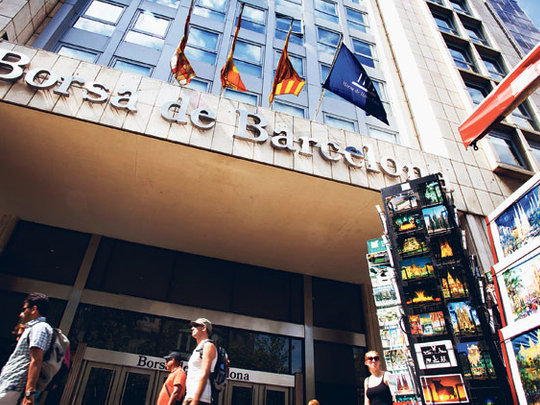
Zurich: Europe's economy expanded more than economists forecast in the second quarter as the fastest growth in Germany in two decades powered the region's recovery.
Gross domestic product in the 16-nation euro area increased 1 per cent from the first quarter, when it rose 0.2 per cent, the European Union's statistics office in Luxembourg said on Friday. That's the fastest in four years and exceeded economists forecast for 0.7 per cent growth, based on the median of 33 estimates in a Bloomberg News survey.
Exports rose a seasonally adjusted 5.2 per cent in June from May, a separate report showed.
Reviving global growth helped the euro-area economy gather strength after the Greek budget crisis forced governments to step up deficit-cutting measures.
Germany, Europe's largest economy, grew in the quarter at the fastest pace since reunification.
The Stoxx 600 Index has gained 10 per cent from an eight-month low in May, helped by a European backstop for indebted nations and the results of stress tests on banks.
"Germany is definitely the powerhouse of the euro area, driving the better-than-expected expansion," said Juergen Michels, chief euro-area economist at Citigroup in London.
Still, "we're probably past the best in terms of economic recovery and will see weaker growth rates in the third and fourth quarters."
From a year earlier, euro-area GDP rose 1.7 per cent after increasing 0.6 per cent in the first quarter, today's report showed.
The euro was little changed against the dollar and bonds stayed lower after the report. The currency was up 0.3 per cent on the day to $1.2862 as of 10.02am in London. It earlier rose to as high as $1.2906 after the German data were published.
In Germany, GDP jumped 2.2 per cent from the previous three months, while the French economy expanded 0.6 per cent and growth in the Netherlands accelerated to 0.9 per cent. The second quarter data also show that the euro area outpaced the US, which grew 0.6 per cent, based on the EU statistics office measure.
Still, some euro-area countries continue to struggle.
Greece, which was forced to seek a EU-led bailout in May, experienced a 1.5 per cent contraction, while Spain's economy grew 0.2 per cent.
The currency's 10 per cent drop against the dollar this year has helped boost exports by making European goods more competitive. The International Monetary Fund on July 8 raised its global growth forecast for this year to 4.6 per cent.
Emerging markets
The US economy, the world's largest, will probably expand 3.3 per cent this year, the Washington-based fund said. The euro- region economy may grow 1 per cent, with Chinese GDP seen increasing 10.5 per cent and India's economy expanding 9.4 per cent, it forecast.
"The growth rates you have in emerging markets are simply outpacing everything," Matthias Zachert, chief financial officer at Leverkusen, Germany-based Lanxess AG, the world's second largest maker of butyl rubber, said on Tuesday.
Markets: Banks lead European stocks decline
European stocks declined, led by banks, amid concern diverging rates of economic growth in the region will hamper the recovery in the second half of 2010. Asian shares gained while US index futures fell.
HSBC Holdings and Banco Santander fell at least 1.9 per cent. Delhaize Group paced declines by retail stocks, slumping 7.3 per cent after trimming its guidance. Vedanta Resources tumbled 6.3 per cent as two people with knowledge of the matter said the company is in talks to buy a controlling stake in Cairn Energy's Indian oil-exploration unit.
The Stoxx Europe 600 Index lost 0.5 per cent to 253.67 as of 12.54pm in London, extending this week's decline to 2 per cent.












